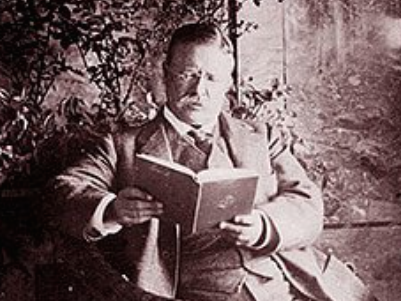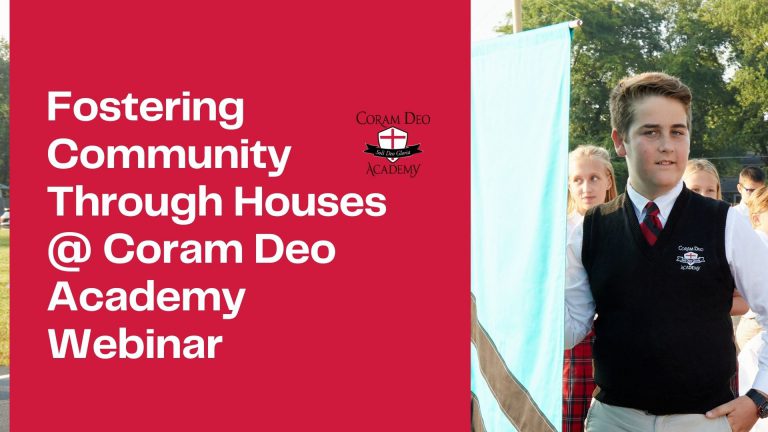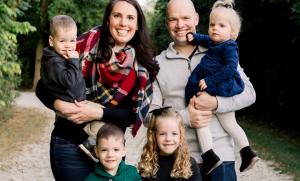by David Seibel, Head of School
A few years ago, I wrote an elevator pitch for explaining to people what classical Christian education is. Although I still hold to what I wrote there, my ideas about classical Christian education have expanded in size and enhanced in clarity.
Classical Christian education has one mission with three distinctives. The mission is to graduate students who love permanent things. The three distinctives are partnership, scholarship, and discipleship.
#1. Permanent Things

Vocational and technical training, albeit essential and significant, are constantly being updated and are the opposite of permanent things. Slow and steady wins the race when it comes to education; that’s not true, though, for training. Vocational and technical training must fit the industry standard’s specifications.
In classical Christian education, we elevate the essentials of truth, goodness, and beauty through reading great books (The Odyssey, The Aeneid, The Inferno, The Brothers Karamozov, Confessions, etc.) in light of the Great Book so that our students can become wise. Therefore, project-based learning and current-event projects are considered secondary because those activities do not confront students with things that are bigger than their current time or place.
CS Lewis wrote,
“Every age has its own outlook. It is especially good at seeing certain truths and especially liable to make certain mistakes. We all, therefore, need the books that will correct the characteristic mistakes of our own period. And that means the old books. All contemporary writers share to some extent the contemporary outlook—even those, like myself, who seem most opposed to it. … To be sure, the books of the future would be just as good a corrective as the books of the past, but unfortunately, we cannot get at them.”
#2. Partnership
Through God’s grace, many parents are becoming aware of the shortcomings of partnering with the state for the nurture and admonition of their children. Here’s the thing— God has appointed three governments to cultivate civilization: the family, the church, and the state. Classical Christian schools believe that something as intimate and eternal, and important as educating the next generation, should not be centralized to the state but rather be overseen by the family and guided by the teachings of the church.
John Dewey, the 20th-century secular educational philosopher, recognized as the father of progressive education, tried to remove the differences in upbringing between various cultural backgrounds by providing a standardized American education. Dewey viewed those cultural and religious differences as damaging and sought to neuter the curriculum of the pursuit of transcendent truth and instead focus on the felt needs of the child.
Dewey’s focus on the child has been proven to be the worst thing for the child because the progressive education project marginalized the family, relativized goodness, and trivialized supernatural religion to something of private personal preference. Therefore, classical Christian education seeks to recover the family as the central educational authority and the school curriculum with truth rather than the child at the center.
Only something solid as eternal truth is sturdy enough to be a center that holds rather than gives way under the pressure of life.

#3. Scholarship
The purpose of the Academy has always been the cultivation of the intellect. If I had a dime for every time a parent was concerned with their child’s social life or sports life instead of their intellectual/spiritual life, I would have at least $5. Again, these things are not insignificant, but football and dances had not, historically, been the main point of schooling until the 20th century. The purpose of a school is primarily academic, that is, intellectual. Although the social and emotional development of a child is crucial, we have schools in our communities so that we cultivate reasonable and responsible people.
Classical Christian schools place a high priority on the life of the mind and the formation of the imagination. In fact, we believe that one of the best ways to destroy a child’s imagination is to make the primary purpose of school social or emotional. Unfortunately, it is quite common to see adults get confused about the roles of the court system, the political system, and the educational system. Education is not a Swiss army knife that is supposed to do all of the jobs of every institution in a civilization.
As Mortimer Adler wrote,
“The main business of an academy is teaching and learning.”
#4. Discipleship
The word disciple simply means learner. In classical Christian education, we believe that wherever you’re at, whatever you’re doing, whoever you’re with, you can do it to the glory of God. Classical Christian schools are keen on creating an atmosphere, a discipline, and a life where the students develop both an assent to the propositional truths of orthodox Christianity but also a personal allegiance to the risen Lord Jesus Christ.
In classical Christian schools, we tend to see great value in integration between the ages rather than segmenting everything by age and grade. Therefore, students are placed in houses so that they develop a smaller community across grades within the larger context of the school.
Additionally, the habits of both the mind and the heart are emphasized. It is common to see boys required to hold doors for girls and older students to clean the lunchroom because many lessons are caught more than they are taught.
This one mission with three distinctives might bring about a host of questions:
- What about test scores, grades, and college placement?
- What about my kids’ social lives?
- Will my son or daughter be self-righteous or elitist in a classical Christian school?
- What about my student being salt and light in the public school?
- How about sports and band and choir?
- How am I supposed to afford the cost?
These are all legitimate questions to be worked through, but here’s why I have come to love Classical Christian education. I am committed to the permanent things, to scholarship, discipleship, and a partnership. To have hundreds of institutions committed to these same ideals provides an amazing opportunity for aligning under a Christ-centered agenda that blesses the next generation.
If my kids only spend about 1/6 of their entire lives under my roof, I’m going all-in on doing everything I can to set them up for success: having a healthy marriage, teaching and modeling the Gospel, and moving heaven and earth to get them the best education money can buy.
Classical Reading List





